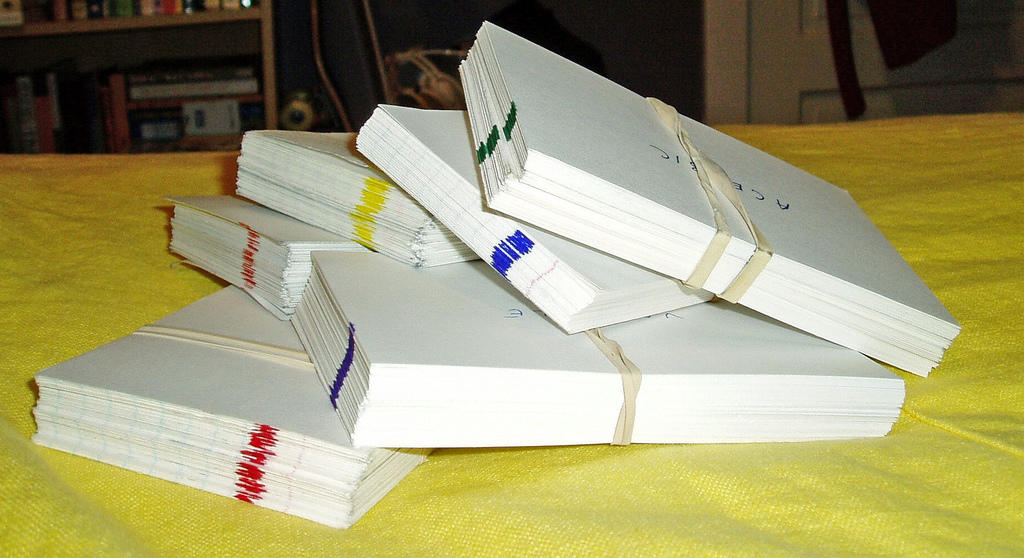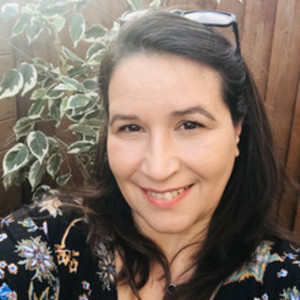Chapters
Always wanted to learn a new language? Signed up for French language course, read every grammar book and pamphlet on how to speak French? And yet you still have trouble finding the motivation to learn vocabulary and do your grammar exercises for your next French lesson?
Here are some suggestions on how to make learning a foreign language fun!

The Best Ways to Learn French
Often, when you learn a language, you tend to concentrate too much on the words in your grammar books - vocabulary lists and French grammar rules explained in long, convoluted paragraphs. So how can you make French learning less frustrating and more enjoyable?
Flashcards and sticky notes
Distill your information to learn it better, and mix it up to help you truly memorize it! Beginners can use flashcards and sticky notes to good effect.
To learn your French vocabulary words, make stacks of flashcards with the French words on one side and the English ones on the other, and shuffle them so they are not always in the same order.
To learn them, you should look at the French and repeat the English word, or recite it the other way around. Or you can put sticky notes all around your house with the words for everyday objects and actions (for example, you might put “breakfast”, le petit déjeuner, at the table instead of la table; or cuisiner in the kitchen) until you are as familiar with them as with the objects themselves.

To learn a language, you can also make flashcards for grammar. Distill the grammar rules to their essentials, put a verb and a tense on one side of the card and its conjugation on the other… there are many ways flashcards can help you with practicing your French.
You can also place French phrases cut out of books on sticky notes throughout your home to practice your understanding of French.
A French language diary
A good way for English speakers to improve their fluency in French is to write a little French every day. A good ways to do this is to buy a notebook, put your dictionary next to it and choose a subject to write about and specific times to do so. Some ideas would be:
- Write your to-do list for the day in French
- Write what happened during the day in French
- Write the plot of your series, a film you’ve watched or a book you’ve read
- Write your thoughts on current events
You will at first be writing only in bullet points or simple sentences. (Hamlet est un Prince. Il vit au Denmark. Son père est mort.) As you progress from beginner French lessons to more advanced, you can write more complicated sentences and use the dictionary less and less.
It’s a wonderful way to improve your language skills and learn to write French without translating in your head.
Language Immersion: learn French by podcast and language partner
The best way to learn a new language is total immersion. Living in the country is, of course, the ideal way to do so. You can take an extended trip to France or take part in an au pair programme.
If going to France is not in your budget, here are some learning tips for an immersive learning experience all by yourself:
- Improve your listening skills: listen to a podcast or the French radio
- Learn by repetition with French songs, by streaming or downloading an Mp3
- Improve your conversational French and learn correct pronunciation with a language exchange partner, a native speaker who will teach French while you teach them English.
- Practise your speaking skills with tutors or private French teachers (for example, here on the Superprof website) - by learning French online via Skype; or you can learn it live from a native speaker who comes to your house.
Of course, to further your comprehension of your second language, you can also watch a French movie or read in French.
Find out more about the best ways to learn French.
Learn French Fast With French Movies
When learning languages, it’s easy to get stuck in a textbook, relying mostly on memorization to improve your comprehension. But knowing all about the indefinite pronoun and verb conjugations or irregular verbs isn’t going to help you expand your vocabulary or teach you to understand the meaning of words in context.
Watching a French movie or TV series will.

Why you should watch films in the French language when studying French
There are two types of vocabulary. This is true for a language you speak as a native speaker as well as for the different languages you might learn later - when you want to learn Italian, learn German or learn Japanese. They are:
- active vocabulary: vocabulary you use every day and that comes easily to you when speaking.
- passive vocabulary: vocabulary that you understand but cannot use in everyday conversation.
French language learning often focuses too much on yet a third type of vocabulary: the one that is constantly being translated from French into English in your head. It’s all right in your beginner French language courses, but as you progress you want to learn to access your French words and expressions directly so you can chat in French comfortably.
Active vocabulary is drawn from the well of passive vocabulary. Speaking with a Frenchman beyond bonjour, merci and bonne chance, for example with a language exchange buddy, will help activate all those common words you learned in your French course.
However, before vocabulary really becomes intuitive, your brain needs to stop translating and start recognising and understanding - associating French words with a thing or action or emotion rather than with an English word.
The best way to do that is to immerse yourself in French. The more you improve your listening comprehension, the bigger the well of vocabulary phrases you can dip into when speaking.
A good way to do this is to switch the audio to French on well-known films and TV series. If you are familiar with the characters and plots, this will let you figure out the meaning of words in context. Knowing you can do so will also bolster your confidence for when you are ready to go out into the shops on your own and order a coffee.
Note that the French you will hear on the telly is more grammatical than that spoken in songs.
If you are still a beginner, you can still enjoy French dialogue with subtitles. If you can, though, you’ll want to listen to the same film or episode once with and once without subtitles, so you can slowly wean yourself from them.
Films and series you might enjoy
Of course you can watch British television in French to improve your grasp of French phonetics, but it’s always easier if the words match the movement of the lips. We can highly recommend the series Lazy Company, a French comedy about a platoon of American soldiers who somehow bumble their way through D-Day and its aftermath.
Recent films to have come out are Demain tout commence (by the director of the heartwarming film The Intouchables) in which a young man from Marseille suddenly finds out he is a father.
Another is The Midwife with Catherine Deneuve, directed by Martin Provost, in which a midwife finds her whole life turned on its head when the maternity she works at closes and her deceased father’s mistress contacts her unexpectedly.
You can follow this link for more recommendations of French films for free French lessons.

Improve Your Language Skills With Books and News in French
If you want to concentrate on your reading skills instead, you might want to consider reading French newspapers or reading French children’s books or novels.
Learning basic grammar with French newspapers
Though during a class your French teacher will probably give you short texts to read, a French newspaper is ideal for learning French at home. Newspapers cover a wide range of topics, ideal for expanding your French vocabulary. Since they need to be understandable to the wider public, most French newspapers have a simple prose that is nonetheless formal.
If you don’t want to subscribe to the physical edition of Le Monde or Le Figaro, a newspaper in French online would be the way to go.
Why not sign up for French lessons online today.

Children’s books: a new sort of learning experience
Of course, the same is true of books. In a way, books are easier to understand as their narrative nature provides more context for words you have never encountered before. Beginners can start with picture books, as there is very little text, but intermediate French students might want to try children’s novels or Young Adult. There are some adult novels that aren’t too difficult a read, either, but here is a (non-exhaustive) list of some children’s books to get you started with your French lesson in this new learning style:
- The Little Prince by Antoine de Saint-Exupéry. An aviator who crashes in the middle of the Sahara meets an odd little boy with a heart of gold. Bittersweet.
- Le Chevalier au Bouclier Vert by Odile Weurless. The adventures of a rather awkward young knight in the Middle Ages.
- L’anné du Mistouflon by Anne-Marie Chapouton. The existence of a mythical creature in the narrative may render this one a little but difficult.
- The Aventures Extraordinaires - the novels by Jules Verne are written in fairly simple prose, though the various inventions of the 19th century might be a stumbling block. Le Tour du Monde en 80 Jours is a good place to start.
- La Guerre des Boutons by Louis Pergaud tells of the rivalry between the youth of two neighbouring villages in 19th-century Franche-Comté. The title comes from the practice of picking off all the buttons off those boys who are bested in the encounters.
- Le Petit Nicolas by René Goscinny. Known as much for its illustrations as for its story, Le Petit Nicolas chronicles the adventures of Nicolas at school in small, easily-digestible chunks.
In addition, if you are bored by toddler books but can’t (yet) handle chunks of narrative, you can read French(-Belgian) comics. The pictures will help you in understanding the plot, and the short dialogue will help you understand French tenses and offer free French lessons if you are willing to try them out. Here are some French Bandes Dessinés to get you started:
- Les Stroumpfs (The Smurfs). The stories are simple and generally very short.
- Boule et Bill. A little boy and his dog. One-page gag comics for those with little time on their hands to study French.
- Gaston Lagaffe. Another gag strip, but with slightly more adult humour (no swearing, though.) Gaston lives at a publishing house, though there is no one who can say they have actually seen him work…
- Astérix le Gaulois. A clever little Gaul and his big friend have adventures throughout the Roman Empire and beyond. The language is simple but the jokes might not be easy to understand.
- Thorgal. More adult, with nudity and adult themes. An imagining of the Nordic world, but with a sci-fi twist that is very subtle.
- Yoko Tsuno. The adventures of a spunky reporter somewhat in the spirit of Indiana Jones
- Les Aventures de Tintin. Another reporter. The Tintin adventures are somewhat dated and have a lot of text, but the characters are pure gold - from the policemen Dupont and Dupond, to professor Tournesol and the Capitaine Haddock (whose swearing is innovative and legendary and no doubt loses much in the foreign translations.)
- Lanfeust des Étoiles. For fans of a somewhat quirky sci-fi genre. Lots of fun.
Find more French classes Glasgow here on Superprof.

Learn How To Speak French With Games
If you are tired of reciting French irregular verbs in your language classes and are looking for other ways to improve your language skills, why not play some games? Games are a tried-and-true teaching method for improving the assimilation of a language. Here are some ideas for games for learning French in action.
Intermediate vocabulary training: “Geography”
Called “Baccalauréat” in French, the idea is quite simple. You settle on some categories (for example, we suggest: Country, animal, food, piece of furniture, the names for items of clothing…). One of the players silently goes through the alphabet until another cries stop, then says the letter they stopped at.
Then the other players try to find things that start with that letter for each of the categories. You get one point for each category you find a word for; no points for passes.
You can have as few or as many categories as you like, though five or six is usually a good number.
For example, if the letter is B and the categories the ones stated above, you could say:
- Benin
- Belette
- Brioche
- Bureau
- Blouse
Or for the letter S:
- Suisse
- Serpent
- Soupe
- Siège
- Soutien-gorge
Practise your grammar with “Word Bits”
To play “Word Bits”, you will need an egg timer. First you need to photocopy some pages from a book in French or have a French magazine at hand (or you can print out pages from a French website). You then want to cut out French verbs, nouns, adjectives and adverbs. Try to have a nice selection. If you want to play often, you might want to consider pasting the pages onto cards before cutting them up.
Then you put all the words in a box or sack and shake them up well.
Every player draws three words and has to build a sentence around them within three minutes.
The sentence needs to:
- make sense. ("the frog catalyses the flame", for example, would not work.)
- be grammatically correct: the verbs and subjects have to agree, nouns and adjectives be in the right gender and number and every word be in the right place in the sentence.
When everyone has finished, the sentences are read out loud and the points are tallied:
- Each of the words drawn count for 2 points if used correctly - the conjugated verbs correct, the adjectives agreeing with their noun in number and gender.
- Each additional noun, verb, adjective or adverb counts 1 point if used correctly. This is to encourage the players to make their sentences as long as possible!
At the end of each round, the words are put back into the sack and the next round drawn out of it.
The first player to reach 100 points wins. Tally in French to practice your French numbers!
Make sure you have a dictionary at hand when counting points to check for gender (dictionaries are not allowed while building sentences), and a grammar textbook to make sure each phrase is structured correctly.
Find more French conversation classes here on Superprof.
French Words and Phrases to Improve Your Spoken French
A native English speaker can have spent days memorizing French grammar rules, get top marks in his French classes and speak it quite fluently, but that doesn’t mean he will understand everything that is said when he takes a trip to France.
Many common phrases used by those for whom it is a mother tongue never make it to the textbooks, and the teachers at language school often forget to teach them. After all, the idea is for you to get around and meet your basic needs. But discovering the common words and phrases that everyone takes for granted but are Greek to a foreigner is one of the little pleasures of learning another language outside the classroom. Some French examples are:
- Il pleut des cordes. It’s raining cats and dogs.
- Il fait un froid de canard. It’s freezing
- Être crevé(e). To be exhausted.
- Avoir ras-le-bol. To have it up to here with something.
- Être blindé. To be drunk.
- Être bien dans sa peau. To feel good and at one with yourself.
- Avoir un coup de foudre. To fall in love with something or someone.
- Avoir les yeux plus gros que le ventre. To have taken more food than you are hungry for.
- Faire la grasse matinée. To sleep in.
So whenever you feel like your language course is useless, that you are going to study French forever before you learn to speak without a mistake - try out some of these tips to improve your French and come across as truly bilingual.
























Hello!
Some great ideas here. I like to watch old French films with subtitles and make brief notes on costumes and so on. If you are a visual learner, take a highlighter and only use two colours not more to help you to process information. For visual learners, it is much better if you use black and white pictures and mind maps as much as possible with them. Get the pupil to close their eyes and use the visualisation method as well. Draw things on a board or tell them to sit near the front. Encourage them to think outside the box. Purchase a camera and teach them how to use it. Show them how to print out and annotate maps and photos of French towns. Invest in technology. Hold up black and white photos and ask them to pick the correct one. Pick up a few storybooks that have a ton of pictures and also order some textbooks that have pictures. Try to make use of colours in the classroom extensively. Don’t forget about other resources like black and white French cartoons, magazines either. Make a collage. Plan trips to a art gallery. Download teaching resources to a phone or computer or create your own. At a loss? Visit a library to look at phrasebooks which can be loaned or search for old movies online or on Netflix to watch during a lesson. Translate picture books.
Auditory learners need to try other methods though. Perhaps have them read the question out loud and engage them in a lively discussion too. As you read a story or article written in French stop and ask them some questions or get them to orally predict what will happen next. Ask them to recite French poetry back to you. Use a tape recorder or CD. Support auditory learners to improve their communication skills at shops, restaurants and hotels in addition. Discuss topics with them in lesson time. Try out some apps. Duolingo is good or ask around for more app recommendations. Again technology can prove to be useful.